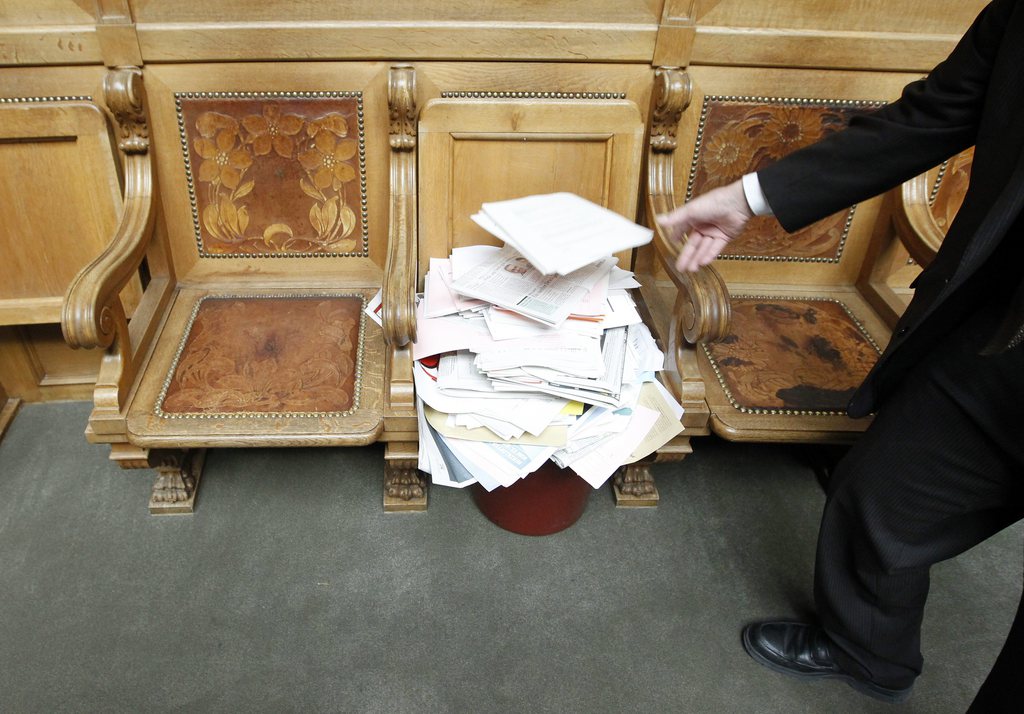Laws create certainty – but may dent state credibility

Banning disposable paper plates for take away food, or charging cyclists to ride through forests? The rise in the number of laws – and proposals for new legislation – has led to criticism that lawmakers are losing sight of common sense.
Roger Christeller runs a food stand on a public square in the centre of Bern. Over the past ten years he has had his day in court because a local law banned the use of paper plates for his crèpes. In 2007 the city authorities introduced regulations aimed at limiting the amount of waste on public ground.
He remains somewhat philosophical about his experience even if the court decision meant he lost business.
“I often wonder if the wrong laws are created and where the common sense has gone,” he says.
The number of new laws passed has nearly doubled over the past two decades.
A multi-party group of centre-right politicians and the business community active mainly in the German-speaking part of the country has come up with their own answer to nip the perceived legal hyperactivity in the bud.
The pressure group awards a special award for “the most unnecessary and most stupid law” hoping to win public attention for its political aim of a lean state.
Gerhard Pfister, a Christian Democratic parliamentarian and manager of a private school in central Switzerland, says the annual award ceremony in a trendy restaurant in Zurich has a clearly humorous note.
“But it is necessary to have a grouping which questions all the regulatory process,” he says.
At the corporate level, Peter Brabeck, chairman of the board of the Swiss-based food multi-national Nestlé, in a recent public speech lashed out against what he perceives as “regulation frenzy”.
“If a company has to invest 80% of its time to ensure it is in line with the rules there is no room to develop strategies to move the company forward,” he said, speaking about Swiss voters’ approval in February of a plan to introduce quotas for foreign workers.
Contradictions
The case of Alois Gmür, co-owner of the Rosengarten brewery in Einsiedeln, is a paradox, some would say.
The increasing number of rules and regulations at the workplace, including special work clothing, meticulous marking of meeting points for emergencies in the factory and special labels for imported barley malt make him despair at times.
“It is primarily the contradictory needs that lead to regulatory activity. Citizens want certainty and clarity.”
Christa Hostettler
He is in charge of sales for the regional brewery in the central Swiss town famous for its Benedictine abbey and its 15th century Our Lady statue. At the same time Gmür has been in politics for half his life and he sits in the Swiss parliament.
“Everything is becoming more and more complicated. It drives you crazy,” he says with a shrug and a bewildered look.
Gmür says the smoking bans in most restaurants led to a slump in beer sales and the increasing paperwork to satisfy the hunger for information of the authorities creates additional bureaucracy.
But the 59-year old knows he has himself to blame, at least partly. As a parliamentarian he is a member of Switzerland’s legislative body and he is irritated by the individual activities by many of his fellow politicians who launch new ideas for even more rules.
As a result many of these rules bear no relation to reality according to Gmür. Alec von Graffenried, speaker of the legal affairs committee of the House of Representatives, for his part says there is consensus among parliamentarians in principle that too many laws do not necessarily make life any better.
But when it comes to the crunch many politicians trying to defend their interests simply throw caution to the wind. “A more coherent approach and broader view are often forgotten.”
More but not always better
His perception is shared to some extent by Alain Griffel, a professor at the University of Zurich’s law faculty. In an opinion piece in the Neue Zürcher Zeitung (NZZ) newspaper, the legal expert launched a broadside against what he considers a steep decline in the quality of legislation to coincide with a flood of laws over the past decade.
Griffel blames parliament, the administration and a general change of attitude for “the erosion of the legislative culture”.
Given the complex cascade of ordinances and rules triggered by a law or even an additional legal provision, it is not easy to quantify the increase in regulations at a federal, cantonal and local level in Switzerland.
The following figures might give an idea.
Another NZZ article singled out amendments to the penal code. While changes to the code were rare in the 1970s, eight amendments were put into force every year between 2008 and 2013.
Pressures
Benefiting from her experience as senior legal adviser to the city of Bern and cantonal authorities, Christa Hostettler says the growing number of rules and laws is a consequence of an increasingly inter-connected life.
Personal ambitions by politicians, fanned by the media or pressure by the administration at a higher level – be it national or from the European Union – all contribute to the legislative procedure.
“Everything is getting more and more complicated. It drives you crazy.”
Alois Gmür
She singles out the activity in the field of zoning where the government used to have some leeway to intervene, but where more and more rules have been defined.
The gradual regulation of road traffic is another example. “Before the introduction of a complex system of speed limits and traffic lights there was a basic rule: It is up to the individual to judge what is appropriate,” she explains.
Credibility
Hostettler is confident that civilisation is not simply subject to an inevitable process of legal activity. She pleads for a pragmatic approach and careful examination of the possible impact of the application of the law.
“Dare to do nothing if there is no convincing reason to act.”
Courts, whose task it is to ensure the uniform implementation of laws, might disagree with that and reject such an approach.
“But this is not necessarily bad. It also shows that a system of checks and balances works,” she says.
Hostettler adds that legal experts have a responsibility not only to create law but also to avoid unnecessary regulation. Sometimes improving the application of existing laws is the right answer.
“Too many laws and particularly badly applied laws can undermine the credibility of the state.”
Citizens no longer trust the authorities and the law enforcement authorities might no longer be in a position to carry out their duties.
Formally governments and parliaments can decide to abolish rules.
“The point is that nobody feels responsible for it,” legal advisor Hostettler sums up.
Legal hyperactivity
Concerns about too much legal activity are a traditional liberal policy issue. In a look back at recent Swiss history, the government has discussed ways of limiting the amount of rules and regulations. In 2005 the cabinet announced it was willing to examine the scrapping of outdated legislation as part of a reform of the administration.
The Schweizer Monatshefte, a liberal academic journal, in 1984 published an essay by then Justice Minister Rudolf Friedrich. He pointed out that legal hyperactivity has been “creeping up” over the decades. He concludes that fighting the activity would be largely cosmetic. Instead he called for broad discussion about the reasons for the volume of regulation.
Spoof award
The award for the “most unnecessary and stupid law” was launched in 2007 by a liberal pressure group. The winners are chosen by online voting. This year’s winner is the humanist Bruno Giordano foundation calling for a mandatory offering of a vegan dish in public canteens.
Previous winners include:
Head of forest owners association, canton Bern: for his idea to introduce a CHF15 mandatory permit for cyclists and horse riders using forest trails.
Former transport minister, Moritz Leuenberger: children under 150cm and 12 years of age must be transported in cars or buses in approved children’s seats.
Head of ports authority, city of Zurich: for strictly applying the letter of the law to prevent a campground owner from installing rubber buffers to protect boats during swells.

In compliance with the JTI standards
More: SWI swissinfo.ch certified by the Journalism Trust Initiative




You can find an overview of ongoing debates with our journalists here. Please join us!
If you want to start a conversation about a topic raised in this article or want to report factual errors, email us at english@swissinfo.ch.